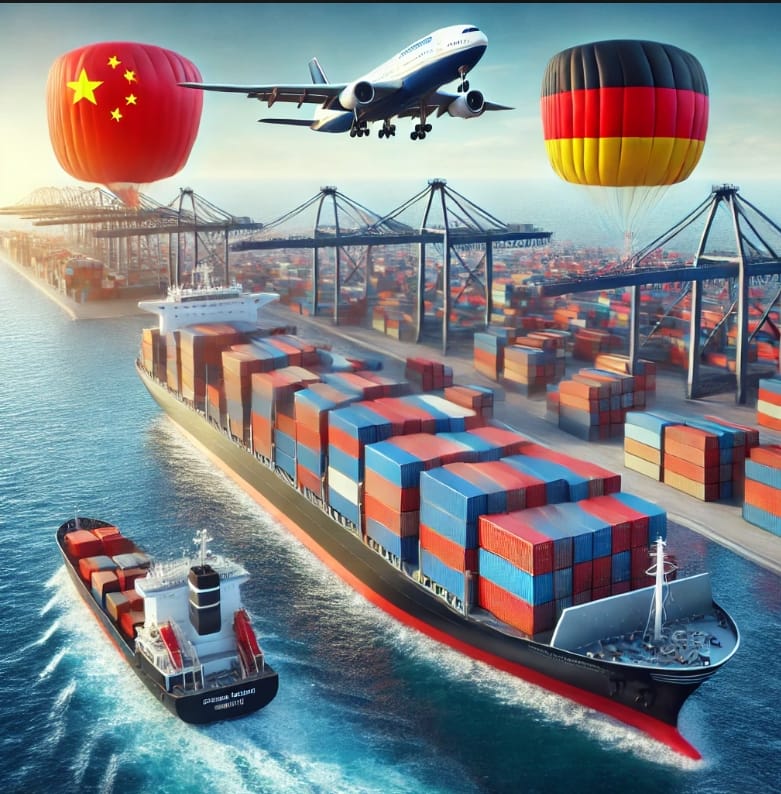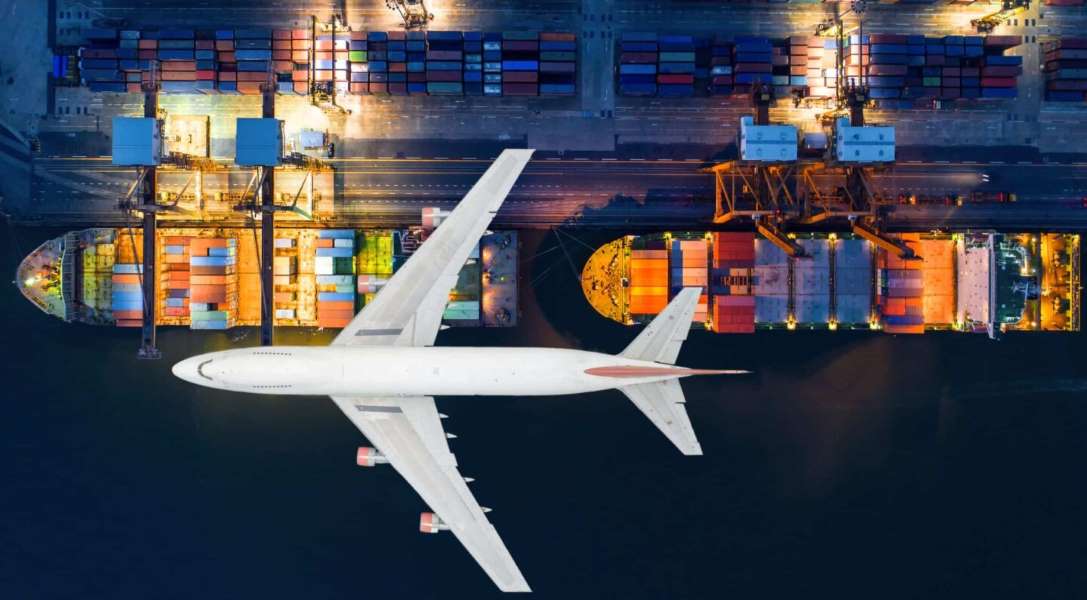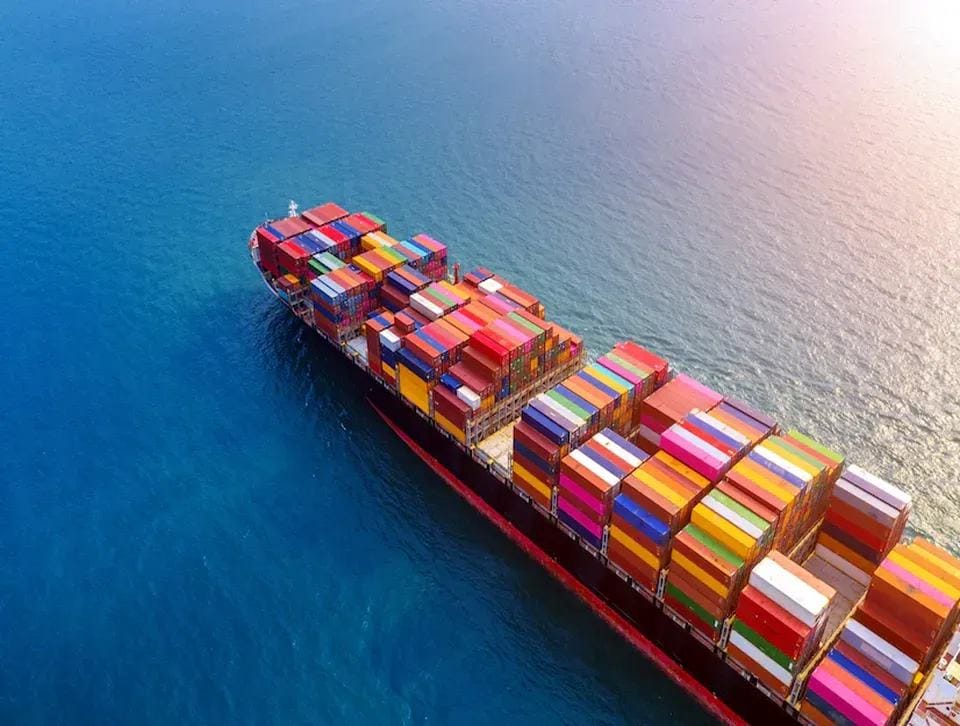As the economic cooperation between China and Germany continues to deepen, China’s major export commodities to Germany, including electronic products, machinery and equipment, and furniture, continue to grow.
The logistics demand for shipping from China to Germany has also increased, and the time of transportation has become a focus of attention for enterprises and individuals. The time efficiency of shipping from China to Germany will be introduced in detail.

Shipping from China to Germany
Sea Freight
Sea transportation is one of the most common methods of international freight transportation. Almost all types of goods can be transported by sea, including perishable goods, dangerous goods, etc., but they need to meet relevant international transportation regulations, especially for bulk cargo transportation.
Air Freight
Air freight is the fastest mode of transportation, but it has certain restrictions on the volume and weight of goods. Overweight or oversized goods are usually not suitable for air transportation, and are suitable for small-volume, high-value, and urgently needed goods.
Rail Freight
Compared with sea transportation and air transportation, the time efficiency of railway transportation is between the two. Railway transportation is suitable for cargoes with larger volume and weight. Railway transportation has less impact on the environment than sea and air transportation, and meets increasingly stringent environmental protection requirements. The transportation routes of China-Europe Express are fixed.
Major Ports or Airports in Germany
Major ports:
- Hamburg Port: As the largest port in Germany, Hamburg Port is one of the largest container ports in Europe and the main gateway for Chinese goods to enter the European market.
- Bremen Port: Bremen Port is located in northern Germany and is an important trade port.
- Cologne Port: Cologne Port plays an important role in inland transportation in Germany and is one of the important distribution ports.
Major airports:
- Frankfurt International Airport: As one of the busiest air cargo hubs in Europe, Frankfurt Airport connects global routes and is an important transit point for Chinese cargo to be transported by air to Germany.
- Munich International Airport: Located in southern Germany, it is an important international air cargo center.
- Dusseldorf Airport: It is also one of the main cargo airports in Germany, connecting multiple international routes.
Shipping Time from China to Germany
The shipping time between China and Germany usually depends on the selected mode of transportation, the specific location of the starting point and the destination, and is also affected by the following factors:
- Weather: Extreme weather, such as storms, snowstorms, etc., may cause transportation delays, especially air and sea transportation.
- Season: During holidays and peak seasons (such as Spring Festival and Christmas), the transportation volume increases, which may cause delays.
- Shipping route selection: Different transportation companies and routes may affect the timeliness of transportation. Choosing direct flights or direct ports will shorten the transportation time.
- Customs and inspection: Some goods may require longer customs clearance time, especially for some special commodities.
Sea Freight Time from China to Germany
Sea Freight mainly departs from major ports in China, passes through the Suez Canal, passes through the Mediterranean and then arrives in Germany. It usually takes 28 to 35 days, which is the longest timeliness and is suitable for goods that are not in urgent need of transportation.
| POL (port of loading) | POD (port of discharge) | Shipping time (days) |
|---|---|---|
| Shanghai | Hamburg | 30-35 days |
| Shenzhen | Hamburg | 28-35 days |
| Qingdao | Hamburg | 28-36 days |
| Ningbo | Hamburg | 28-34 days |
| Shanghai | Bremen | 29-34 days |
| Shenzhen | Bremen | 30-35 days |
| Qingdao | Bremen | 28-33 days |
| Ningbo | Bremen | 29-34 days |
| Shanghai | Cologne | 30-35 days |
| Shenzhen | Cologne | 28-34 days |
| Qingdao | Cologne | 28-35 days |
| Ningbo | Cologne | 29-34 days |
Air Freight Time from China to Germany
The timeliness of air transport is affected by factors such as flight frequency, flight distance, airline and transit time. It takes about 3-7 days to transport from China to Germany. In order to ensure timely arrival, you can choose a direct flight to avoid time delays caused by stopovers or transfers.
| Departure Airport (China) | Arrival Airport (Germany) | Shipping time (days) |
| Shanghai Pudong | Frankfurt | 5-7 days |
| Guangzhou Baiyun | Frankfurt | 4-7 days |
| Beijing Capital | Frankfurt | 4-6 days |
| Shanghai Pudong | Munich | 4-7 days |
| Guangzhou Baiyun | Munich | 5-7 days |
| Beijing Capital | Munich | 3-7 days |
| Shanghai Pudong | Dusseldorf | 4-7 days |
| Guangzhou Baiyun | Dusseldorf | 6-7 days |
| Beijing Capital | Dusseldorf | 5-7 days |
Rail Freight Time from China to Germany
The biggest advantage of rail transport is the balance between time and cost. Compared with sea transport, rail transport time is greatly shortened and cheaper than air transport. Rail transport is highly secure and usually takes 16 to 20 days, making it suitable for bulk commodities and goods with medium time requirements.
| Departure City(China) | Arrival City(France) | Shipping time (days) |
|---|---|---|
| Zhengzhou | Hamburg | 16 – 20 days |
| Chongqing | Hamburg | 17 – 21 days |
| Wuhan | Hamburg | 16 – 22 days |
| Zhengzhou | Duisburg | 15 – 20 days |
| Chongqing | Duisburg | 16 – 20 days |
| Wuhan | Duisburg | 16 – 21 days |
Learn more about shipping times to other countries below:
How Long Does it Take to Ship from China to Greece?
How Long Does it Take to Ship from China to France

Tips to Shorten Shipping Time from China to Germany
The shipping time from China to Germany is affected by many factors, but by adopting some strategies, you can effectively shorten the shipping time.
Optimize logistics routes
Choosing direct routes can greatly reduce the time for midway stops and ship changes
Handle export customs clearance procedures in advance
Before shipping the goods, understand the German import regulations, ensure that they meet local import requirements, and ensure that all export documents are ready to avoid customs clearance delays during transportation.
- Commercial invoice
- Packing list
- Certificate of origin
- Bill of lading
- Import license
Choose DDP shipping
The DDP transportation (Delivered Duty Paid) mode means that all tariffs and fees have been paid before transportation, which can avoid the detention of goods due to tariffs after arriving in Germany.
Choose a reliable freight forwarder
Experienced freight forwarders are familiar with the China-Germany transportation process, and can optimize the transportation route and coordinate all aspects of transportation, thereby shortening the overall transportation time.
Track transportation progress
Real-time monitoring of goods: Through the tracking system provided by the logistics company, you can keep abreast of the transportation status of the goods at any time, deal with any possible problems in a timely manner, and avoid additional transportation time due to delays.
Book space or transportation in advance
Ensure that the goods can book space or train position in advance, especially during peak periods, to reduce queuing time caused by transportation tension.
Cost of 20ft and 40ft Containers from China to Germany
Since different ports have different wharfage, loading and unloading charges, and demurrage charges, the following are the detailed charges for transporting 20ft and 40ft containers from different ports in China to major ports in Germany:
| POL (port of loading) | POD (port of discharge) | 20ft container cost | 40ft container cost |
|---|---|---|---|
| Shanghai | Hamburg | $1850-$2850 | $3000-$4200 |
| Shenzhen | Hamburg | $1800-$1800 | $3050-$4850 |
| Qingdao | Hamburg | $1950-$2950 | $3050-$4750 |
| Ningbo | Hamburg | $1800-$2900 | $3150-$4850 |
| Shanghai | Bremen | $1850-$2750 | $3050-$4700 |
| Shenzhen | Bremen | $1800-$2800 | $2800-$4800 |
| Qingdao | Bremen | $2050-$2950 | $3050-$4750 |
| Ningbo | Bremen | $2000-$2950 | $2950-$4850 |
| Shanghai | Wilhelmshaven | $1850-$2750 | $3150-$4750 |
| Shenzhen | Wilhelmshaven | $1950-$2850 | $3000-$4900 |
| Qingdao | Wilhelmshaven | $2000-$2800 | $3100-$4800 |
| Ningbo | Wilhelmshaven | $1950-$2800 | $3050-$4950 |
Learn more: How Much Does it Cost to Ship from China to Germany?

Steps for Shipping from China to Germany
The logistics process of transporting from China to Germany involves multiple steps, each of which is crucial to ensure that the goods arrive at their destination on time and safely.
Determine the mode of transport
Choose the appropriate mode of transport based on the nature of the goods, timeliness requirements, budget and other factors.
Choose a freight forwarder or logistics company
Working with an experienced freight forwarder or logistics company can help you plan the transportation route and handle customs clearance, insurance, cargo tracking and other matters.
Prepare goods and packaging
Make sure the goods are packaged as required to avoid damage during transportation. If it is sensitive goods (such as fragile or dangerous goods), special handling is required to meet international transportation standards.
Transport from China to Germany
Ship to Germany by choosing a good logistics method
Import customs clearance
After arriving in Germany, the goods need to undergo import customs clearance. This process includes:
- Customs declaration: German customs will require the necessary import documents, payment of customs duties and value-added tax (VAT) depending on the type and value of the goods.
- Inspection and quarantine: For some special goods (such as food, medicine, dangerous goods, etc.), additional inspection and quarantine may be carried out.
Goods Arrival and Delivery
Depending on customer needs, goods may need to be further distributed, organized, delivered to the end customer or for local distribution.
The transportation process from China to Germany is relatively complicated. Through this article, you can understand the detailed process and choose a suitable freight forwarder to ensure that each link goes smoothly and the goods arrive at the destination on time.
